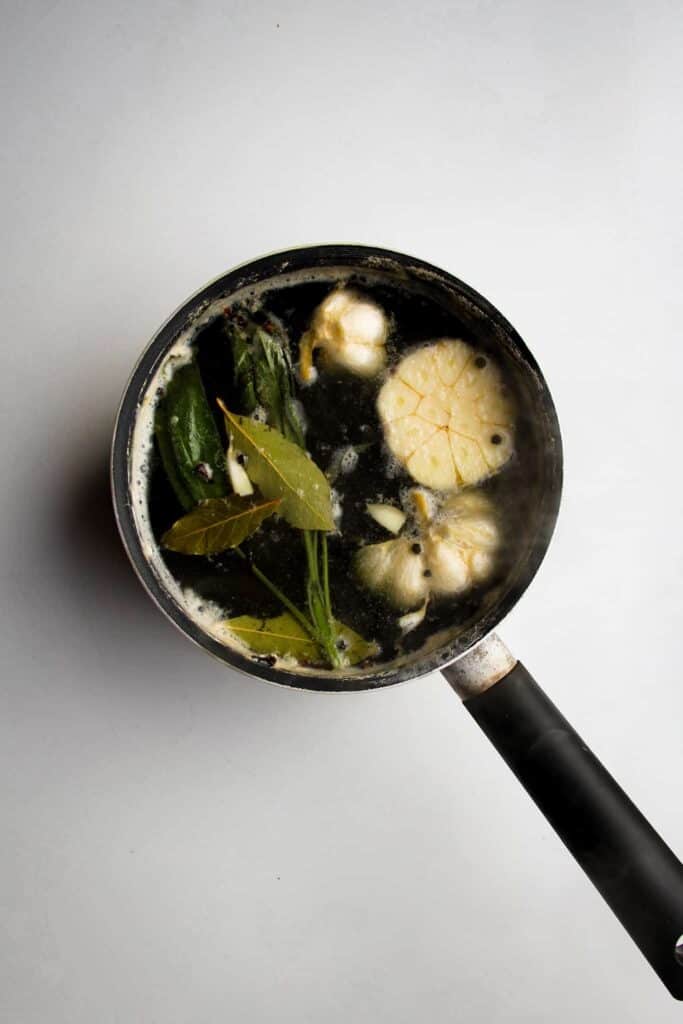To brine or not to brine a chicken is actually a big debate in the food world. I’d like to settle this debate for you, the humble home cook, so you don’t have to waste time thinking about it. Do the brine. Trust me.
I’m definitely a brine kinda guy for a few reasons. The meat will be much more juicy and harder to overcook if you brine the chicken. This is just what you need over the holidays. When you cook at home, it’s helpful to have a method that makes things a little easier. This is especially true if you’ve had a few drinks and forget about the poor bird in the oven!
The brining process keeps the chicken juicier longer, so it’s more difficult to overcook. That’s why most professional chefs use this technique. It’s practically cheating.
Brining is a simple but effective technique to make chicken breast incredibly moist, tender and flavorful. It works by using a saltwater solution to alter the structure of the meat at a molecular level, allowing it to retain more moisture as it cooks. This prevents the dreaded overcooked, dry chicken breast texture.
Brining is especially helpful for frozen chicken breasts that tend to get dry. Here is a full guide on how to brine frozen chicken breast to make it the juiciest, along with tips on how to season, cook, and store brined chicken.
Why Brine Frozen Chicken Breast?
Because it doesn’t have much fat or connective tissue, chicken breast is notoriously easy to cook too long. Chicken that has been frozen is even more likely to dry out when it is cooked. This is because when ice crystals form, they damage the muscle fibers and cell walls, making it easy for water to escape during thawing and cooking.
Brining solves both these problems by altering the chicken at a molecular level to retain liquid inside When soaked in a saltwater brine, the chicken breast absorbs extra moisture. The salt also partially unravels and softens the muscle fibers, so they can swell up with and hold onto more liquid too
When you brine meat, you can cook it a little too long without drying it out. It also builds tons of flavor right into the chicken. To put it simply, brining makes sure that the chicken breast is always tender, juicy, and tasty.
How Does Brining Work?
A brine is simply a saltwater solution. An osmosis process takes place between the salt and the meat’s proteins. This helps the brine get absorbed deeply into the tissue.
The salt breaks down some proteins on the surface of the meat. This allows liquid to be drawn inside the muscle fibers, which then swell up to soak in the moisture. Overall, the brined chicken can hold onto more liquid, even after cooking.
Brining also makes the meat a little more pliable, effectively tenderizing it. Salt has a similar impact as an acidic marinade, softening muscle fibers so they don’t squeeze the moisture out as they contract during cooking.
Finally, any seasonings infused into the brine get carried deep into the chicken breast too. This adds big flavor all the way through.
How Long to Brine Frozen Chicken Breast
- Boneless chicken breasts: 30 minutes to 1 hour
- Bone-in chicken breasts: 1 to 2 hours
Frozen chicken takes a little less time to brine than fresh since the ice crystals have already broken down the tissue somewhat. For boneless breasts, a 30 minute soak is sufficient, while bone-in parts may take up to 2 hours since it takes longer for the brine to penetrate.
Don’t exceed 2 hours or the salt will start to break down proteins on the exterior, giving an unappealing mushy texture. If brining for the full 2 hours, rinse the chicken briefly under cool water and pat dry before cooking.
Simple Brine Recipe for Chicken Breasts
The basic brine only requires two ingredients: water and salt. For food safety, it must be chilled in the refrigerator while brining.
Ingredients:
- 4 cups cool water
- 1/4 cup kosher salt
Directions:
- Combine water and salt in a bowl or resealable plastic bag. Stir to dissolve salt.
- Add chicken breasts and submerge in brine. If needed, weigh down with a plate.
- Refrigerate 30 minutes to 2 hours.
- Remove chicken from brine; pat dry with paper towels.
- Cook as desired. Discard used brine.
Tips for Flavorful Brines
While a plain saltwater brine effectively keeps chicken moist, you can add other ingredients to infuse more flavor:
- Sugar or honey – Helps chicken caramelize when cooked. Use 1/4 cup.
- Herbs and spices – Try rosemary, thyme, oregano, garlic, peppercorns.
- Citrus – Lemon, lime or orange slices or juice.
- Vinegar – Boosts flavor; use sparingly to avoid mushiness.
- Beer or wine – Impart subtle flavor; use 1/2 cup.
Make sure brine is cool before adding chicken. Discard used brine as it can harbor bacteria.
How to Cook Brined Chicken Breasts
Brined chicken stands up very well to quick, hot cooking methods like grilling, broiling, sautéing or pan frying. The salt helps the meat retain moisture even when exposed to high heat.
You can also bake or poach brined chicken breasts. Just avoid prolonged simmering or stewing methods which will draw out moisture over time.
Always cook chicken to a safe internal temperature measured with a meat thermometer. Chicken breasts should reach 165°F. Allow to rest 5 minutes before slicing for perfectly juicy meat.
Can You Freeze Brined Chicken Breasts?
It’s best to brine chicken just before you plan to cook it for maximum juiciness. However, you can safely freeze brined chicken breasts for later use:
- Brine chicken as directed. Rinse, pat dry and place on a tray in a single layer.
- Freeze until solid, then transfer to a freezer bag or airtight container.
- Store frozen brined chicken up to 2 months.
- Thaw in the refrigerator before cooking. Cook within 1 to 2 days.
The salt in the brine helps keep the texture from degrading over time in the freezer. But for best results, minimize the time between brining and cooking whenever possible.
Get Perfectly Moist Chicken Breasts Every Time
Brining makes it practically fool-proof to get tender, flavorful chicken breast regardless of whether it’s fresh or frozen. Simply submerge the meat in a chilled saltwater solution before cooking as directed.
The salt alters the chicken at a molecular level to retain more moisture, while any flavorings infused into the brine get carried deep into the meat too. Cook brined chicken breasts quickly over high heat until cooked through and juicy.

How Long to Brine a Chicken or Turkey?
The bigger the bird, the more time it will need for the salt to slowly penetrate the meat. Without getting too technical here’s my advice:
- Chicken – Overnight to 1 day in the brine
- Turkey – 2-3 days in the brine
The Downside to Brining
Be careful when you brine because the extra salt can ruin turkey or chicken gravy. But this brine is not too high in salt so it is still possible to make a delicious gravy from the drippings of the roasted chicken or turkey.
To solve this, I recommend using extra unsalted chicken stock to balance the saltiness from the drippings and not adding any extra salt to the gravy.

How to Brine Chicken Breasts
FAQ
Can you put frozen chicken breast in brine?
As the chicken thaws, I brine it by putting it in cold, salted, and seasoned water. I then put it in the fridge and stir it often. I often use buttermilk in my brine.
Do I need to defrost chicken before brining?
Can You Brine Frozen Meat? Yes. You do not have to defrost it before brining. The best way to brine frozen chicken wings is to let them defrost first, since they are easy and quick to do.
What is the simple brine formula for chicken?
Try 1 gal warm water, 1/2 c kosher salt, 1 c brown sugar for a basic brine. Oct 13, 2022.
Is it okay to soak frozen chicken in water?
It’s fine. The water just helps to defrost the chicken. It shouldn’t be left more than 30 minutes at a time, generally.
